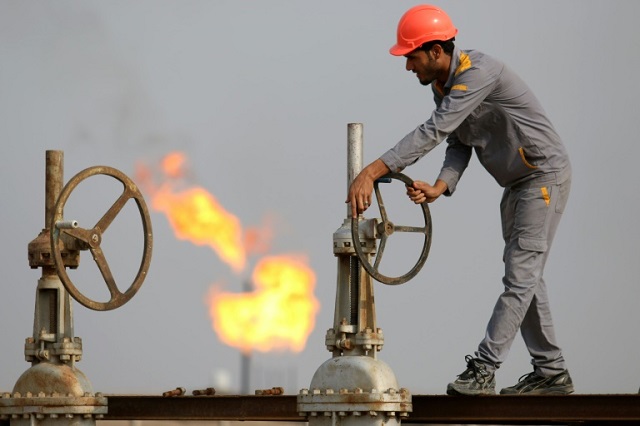
Since 2017, the Gulf states and Russia have forged a stable energy alliance under the umbrella of OPEC+
Cairo, Egypt | Xinhua | Saudi Arabia, the United Arab Emirates (UAE) and Qatar, key members of the Organization of the Petroleum Exporting Countries (OPEC), have remained hesitant to increase oil and gas exports, though the United States and the European Union (EU) are urging the Gulf states to do so.
The West’s move is aimed at stabilizing the global energy market, as energy prices remain high with the U.S. and EU ban on Russia’s energy exports following the Russia-Ukraine conflict.
Analysts say that the Gulf states are trying to strike a balance between the United States and Russia, as their relations with the United States are tested by the impending revival of the 2015 Iran nuclear deal, which may pose a threat to them, while they are unwilling to cut off ties with Russia, as the military and energy ties with Russia have become stronger in the past few years.
U.S., EU MOVES
The United States recently sent a large shipment of Patriot anti-missile interceptors to Saudi Arabia, which the kingdom had requested since late last year to counter drone and missile attacks by the Houthi militia in Yemen, according to U.S. media.
The move came as the Biden administration tries to convince Riyadh to pump more crude oil to help contain soaring prices spurred by the Russia-Ukraine conflict.
Prices of fuel, oil and gas have skyrocketed in the EU after the United States and some EU countries imposed sanctions on Russia’s exports.
Senior British and German officials recently traveled to the Gulf countries to persuade the oil-rich nations to expand their spare energy capacity to fill the void left by Russia’s import ban.
On March 16, British Prime Minister Boris Johnson visited the UAE and Saudi Arabia to discuss the stability of the global energy market.
Johnson’s tour to the Middle East was followed by Germany’s Federal Minister for Economic Affairs and Climate Action Robert Habeck, who visited Qatar and the UAE last week to search for alternatives to the Russian gas supply following the U.S.-led sanctions on Russia.
GULF RESISTING INCREASING EXPORTS
Although leaders of the UAE and Saudi Arabia have reiterated the importance of global energy security and energy market stability, they have not increased output.
On March 23, Crown Prince of Abu Dhabi Sheikh Mohammed bin Zayed Al Nahyan once again emphasized that “the UAE is keen on global energy security and the stability and balance of the energy market.”
On March 24, the Saudi government said in a statement that the OPEC+ agreement has an essential role in maintaining the balance and stability of the oil market.
Neither country, however, has increased its output.
“It is in the Gulf states’ interests to keep energy costs high,” said Sun Xia, associate researcher with the Institute of International Relations at China’s Shanghai Academy of Social Sciences.
Since 2017, the Gulf states and Russia have forged a stable energy alliance under the umbrella of OPEC+. After their successful collaboration in stabilizing oil prices, the Gulf states no longer want to be led by American politicians and financial elites, Sun noted.
STRIKING BALANCE BETWEEN U.S., RUSSIA
The Biden administration has been disregarding the Gulf states’ biggest security concern — Iran’s Shiite-dominated government, Sun said.
If Washington and Tehran clinch a nuclear deal, Iranian oil will return to the international market and compete with Gulf oil. Moreover, expanding Iranian influence in Yemen, Lebanon, Iraq and Syria would pose a severe danger to the Sunni sphere of influence, Sun added.
The Gulf states’ strategy to strike a balance between the United States and Russia reflects their attitudes toward the two countries’ dominance in the Middle East, said Zou Zhiqiang, researcher of the Center for Middle Eastern Studies at China’s Fudan University.
The United States retains a great influence in regional politics in the Middle East with the help of its allies. However, its recent strategic withdrawal from the Middle East, as well as a series of irresponsible behaviors, has made some of its allies nervous and start to question the U.S. capability to ensure their safety, said Zou.
The U.S. geopolitical retreat has stood in sharp contrast with Russia’s active involvement in the Middle East, said Zheng Rong, associate researcher of the Center for Arab Studies at China’s Zhejiang International Studies University.
Russia has carried out cooperation with the Gulf states in oil and gas exploitation, military equipment technology, use of nuclear energy and other fields, and has also become an indispensable force to solve the crises in Syria and Libya, making it a strategic partner for several countries in the Middle East, Zheng added.
When it comes to financial interests and vital national interests of oil and gas, the Gulf states won’t budge easily, Sun said.
The Gulf states will not cooperate with the United States in a meaningful way if the Biden administration does not change its Middle East policy, Sun added.
*****
Xinhua
 The Independent Uganda: You get the Truth we Pay the Price
The Independent Uganda: You get the Truth we Pay the Price


